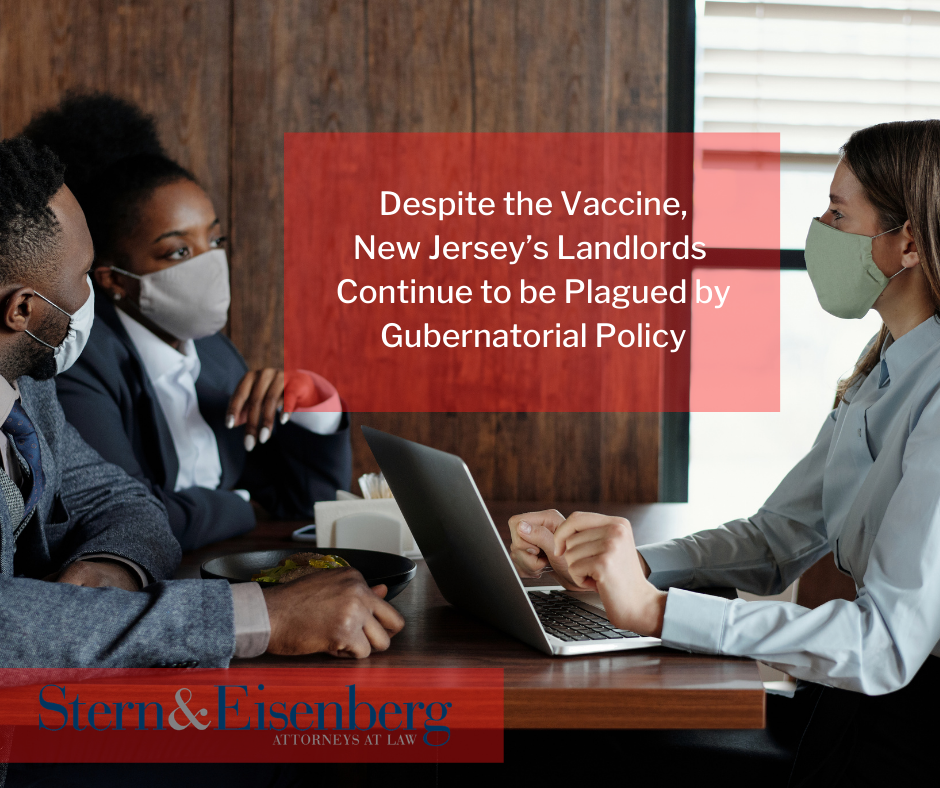by: David Lambropoulos, Esquire

It goes without saying that this has been a difficult year for everyone. This is particularly true with respect to New Jersey’s landlords, who have borne the full brunt of government imposed lockdowns and the predictable payment defaults they have caused. Landlords now find themselves in a vulnerable position that was once unimaginable.
For the 10th time since March, 2020, Governor Murphy recently issued an Executive Order extending New Jersey’s Public Health Emergency through January, 2021. This extension, when read in conjunction with Executive Order # 106, prohibits Sheriffs’ Officers from removing tenants solely due to non payment of rent through March of 2021. It takes little creativity to envision an 11th, 12th or 13th extension in the months to come. Landlords therefore find themselves in a precarious position where they have few options to deal with tenants who may be over a year past due in their rental obligations. Although Landlords may initiate eviction proceedings, their inability to remove non-paying tenants for the foreseeable future is heavily straining their resources. Landlords’ mortgage payments and New Jersey’s notoriously high property tax obligations remain due and owing, though the revenue streams they rely on to satisfy them have been dammed up by these Gubernatorial actions.
What is a landlord to do if they find themself in this predicament?
Unfortunately, there is no magic bullet, one size fits all solution or other metaphor to come to the rescue. Landlords who still have a mortgage on their rental property should first look to their lenders for assistance. Depending on whom their lender is, they may be eligible for payment forbearance or similar assistance. Landlords with federally backed mortgages are generally eligible for up to one year of payment forbearance if they are suffering from a covid related hardship. Although all payments will eventually come due, federally backed mortgage lenders are required to work with their borrowers to either modify or extend the loan at the conclusion of the forbearance period. Conventional borrowers are entitled to less protections and therefore must work with their lenders to see what programs are available to them. In either case, the landlord needs to be proactive to protect their ownership interest, their credit and their sanity.
Landlords should also try to work with their tenants. Though many tenants are themselves struggling due to lost employment or wages, they may be able to make partial payments until they get back on their feet and can satisfy all outstanding arrearages. If negotiations fail, a Landlord might consider initiating an eviction action predicated on non-payment. Even though lockouts are generally prohibited courtesy of Governor Murphy’s Executive Orders, getting the process started now should put them towards the front of the line when normal processes resume. Landlords should also keep in mind their recourse against a non-paying tenant is always two fold: they have the ability to evict to re-claim the property and to sue the tenant for all sums due and owing under the lease. Though the latter option has historically not been exercised because the eviction process was relatively swift, it now warrants consideration. Filing a breach of contract / unjust enrichment suit may motivate a non paying tenant to vacate the premises or bring them to the table to negotiate an amicable financial resolution. If the Landlord’s goal is to facilitate an expedient and dignified exit from the property, initiating a monetary lawsuit may advance those interests.
It is imperative that landlords consult an experienced attorney to help them through this process. Though lockouts predicated solely on non-payment are currently prohibited, there are a few exceptions to that general rule. Successful navigation of these trying times requires landlords to be patient, compassionate and creative. On a positive note, there do appear to be at least two glimmers of light at the end of the proverbial tunnel: (1) an effective vaccine is being distributed; and (2) Governor Murphy must defend his seat in November of 2021.
David Lambropoulos is the managing attorney of Stern & Eisenberg’s New Jersey office. He has significant experience representing landlords and property owners and is available for a consultation to discuss the specifics of your case.
*This article is for informational purposes only and does not constitute (and should not be inferred as providing) legal advice. Every case is unique and must be evaluated by a qualified attorney before a meaningful recommendation can be provided.*
